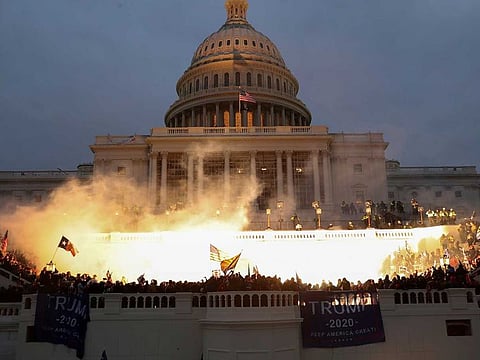Storming of US Congress will have global repercussions
Crisis of democracy is not exclusively American as populism spreads in Europe

In an interview with the British newspaper, The Times, in 2015, former US Defense Secretary, Donald Rumsfeld, vehemently denied that exporting democracy to Iraq was the main motive behind the US invasion of that Arab country 12 years earlier.
Rumsfeld further stated that “the idea that we could fashion a democracy in Iraq seemed to me unrealistic.” Writing in Mother Jones, Miles E. Johnson responded to Rumsfeld’s claim by quoting some of his previous statements where he, repeatedly, cited democracy as the main reason behind the US invasion, a war that was one of the most destructive since Vietnam.
Certainly, it was not Rumsfeld alone who said so. Indeed, ‘democracy’ was the buzzword, repeated by thousands in US government, the military, mainstream media, and the numerous think tanks that dotted the intellectual and political landscape of Washington.
One could not help but reflect on the subject when, on January 6, thousands of Americans stormed the Washington Plaza, climbing the walls of Capitol Hill and taking over the US Congress. A country seen as the defender of democracy worldwide was suddenly struggling to defend its own democracy.
In the case of Iraq, as soon as US soldiers stormed into Baghdad, they hurriedly occupied all government buildings. Soldiers were filmed rampaging through the offices of former Iraqi ministers. Similar scenes were repeated in Washington 17 years later, this time in the offices of top US legislators, including the Speaker of the House of Representatives, Nancy Pelosi. US Congressmen and women were forced to hide under their desks or to run for their lives.
The violent events in Washington have been depicted by US mainstream media as a crisis, allegedly instigated by a president who refused to concede. The truth, however, is far more complex. While Donald Trump may be blamed for the events of January 6, the departing president is a symptom of America’s rooted democracy crisis.
Famed American linguist and historian, Noam Chomsky, has long argued that the US is a country that is governed by the interests of the powerful. Proponents of Chomsky’s assertions argue that, long before Trump became president, the dichotomy of American democracy has expressed itself in the way that the American people interact with their supposedly democratic institutions.
While the US economy is facing massive challenges due to various factors, including the government’s mishandling of the COVID-19 pandemic, the people’s views of their government are now manifesting themselves in new ways, including, as was the case on January 6, violence.
America’s current constitutional crisis, which is unlikely to be resolved soon due to the political polarisation, is compounded by an external political crisis. Historically, the US has defined and redefined its mission in the world based on lofty spiritual, moral and political maxims, starting with ‘Manifest Destiny’, to fighting communism, to eventually serving as the defender of human rights and democracy around the world.
It must be said that the crisis of democracy is not an exclusively American one as populist parties throughout the Western hemisphere, in fact, the world, have been rising at an alarming speed. This rise can be attributed to the deepening economic woes worldwide, the unprecedented refugee crisis, and the COVID-19 pandemic, among other reasons.
For the US, however, the struggle for democracy is accentuated by the fact that many, especially within the US government and intellectual classes, have long perceived the US to be the world’s leading democracy.
Consequently, the storming of US Congress will have global repercussions, not least among them the weakening of the US self-ascribed role as a defender of democracy worldwide. It remains to be seen whether the US democracy doctrine will remain a prominent feature in US foreign policy during the first term of the Joe Biden Presidency.
— Ramzy Baroud is a journalist and editor. He is the author of five books.







